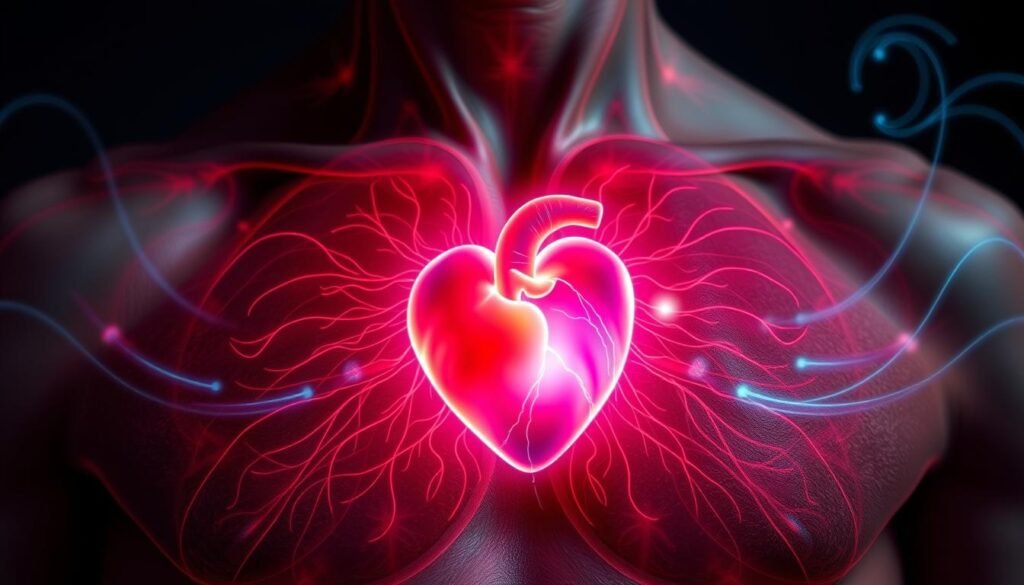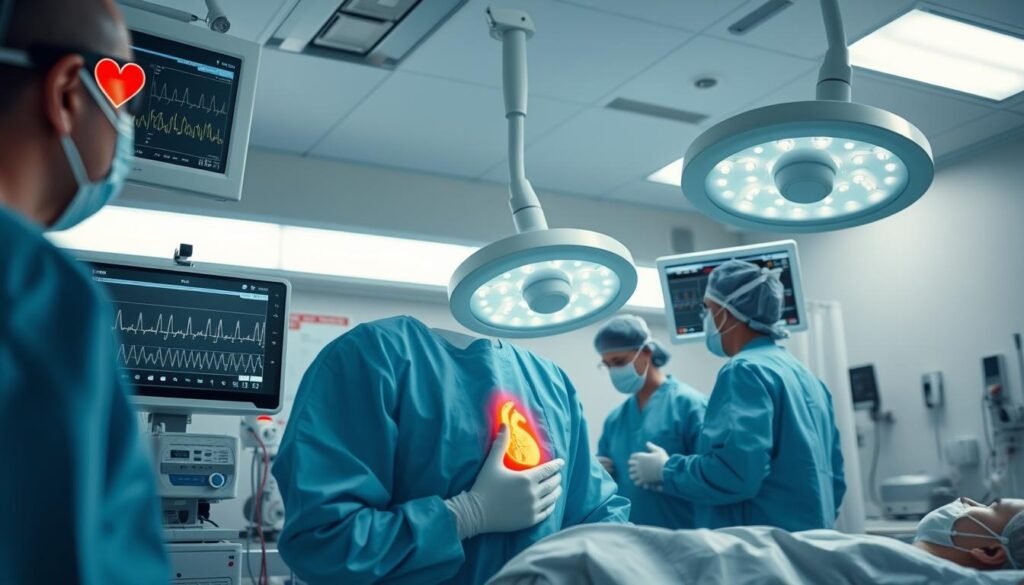Did you know about 7.6 million Americans go to the emergency room for chest pain every year? It’s crucial to know when chest pain needs a doctor’s look. Chest pain can feel different, from dull to sharp. Many cases are not serious, but it can scare us because it might mean heart issues. Knowing heart attack signs and when to rush for help can save lives.
Chest pain’s signs and causes vary, as does advice on when to get help. Conditions like anxiety can cause similar feelings, which makes telling them apart important for treatment. Anxiety can show up as chest pain. You can learn more about it here.
Key Takeaways
- Chest pain accounts for millions of emergency room visits each year.
- Not all chest pain is related to heart conditions; various causes exist.
- Immediate medical attention is crucial when experiencing alarming symptoms.
- Understanding heart attack symptoms can help differentiate conditions.
- Anxiety and stress may also lead to physical symptoms resembling chest pain.
Understanding Chest Pain: An Overview
Chest pain can feel different for everyone. It ranges from sharp aches to subtle feelings like pressure. Knowing the types of chest pain helps you figure out what you’re feeling. It also tells you when it’s time to get medical help.
Many things can cause chest pain, related to both the heart and other parts of the body. Heart issues might make you feel pain that moves to your arm, neck, or jaw. This could mean angina or a heart attack, caused by not enough blood getting to your heart. Angina can feel like your chest is being squeezed and might get better with rest. A heart attack pain lasts longer than 15 minutes and may come with trouble breathing or sweating.
Chest pain also comes from lung problems, like clots or pneumonia, and stomach issues, such as acid reflux. Sometimes, injuries or stress like panic attacks can feel like heart pain.
Talking clearly with your doctor about your chest pain is important. Tell them how long and how bad it hurts, and what other symptoms you have. Knowing if your pain is from your heart or not can help decide how fast you need treatment.
| Type of Pain | Description | Common Causes |
|---|---|---|
| Pressure or Tightness | Feeling of squeezing or heaviness in the chest. | Angina, heart attack |
| Sharp or Stabbing | Sudden, intense points of pain that can come and go. | Pleurisy, costochondritis |
| Burning | Similar to heartburn, can radiate to the throat. | GERD, esophagitis |
| Aching | Constant or persistent dull pain. | Myocarditis, muscle strain |
| Radiating Pain | Pain that spreads to the neck, jaw, arms, or back. | Heart issues, referred pain from other conditions |
The Common Signs of Chest Pain
Chest pain varies from mild discomfort to severe pressure. It’s crucial not to ignore it. Many people feel chest pain as a sign of a heart attack. Knowing what these symptoms mean is vital.
Some may experience angina symptoms, like pain that spreads to the shoulders, neck, jaws, or back. These are potential signs of heart attack. It’s easy to brush off this discomfort. But, it’s important to know that chest pain can mean serious health issues. If the pain is bad or lasts more than ten minutes, get help right away.
People with chest pain might also feel:
- Shortness of breath
- Excessive sweating
- Nausea
- Dizziness
Knowing these extra symptoms helps tell regular discomfort from serious heart conditions. If you notice these symptoms of chest pain with others mentioned, it’s crucial to see a doctor. They can check you out and offer treatment if needed.
If you have chest pain, listen to your body. Trusting your gut to seek help quickly can save your life.
Possible Causes of Chest Pain
Chest pain comes from many sources. It’s either heart-related or from other causes. Knowing the difference is key to getting the right help.
Heart-related chest pain could mean a heart attack or inflammation around the heart. Conditions like myocarditis are often caused by viruses. Signs include shortness of breath and feeling dizzy or light-headed.
Non-heart issues can also cause chest pain. Lung problems, like pneumonia, hurt when you breathe. GERD can feel like a heart issue, making diagnosis hard.
Chest pain can signal various underlying ailments, emphasizing the need for careful evaluation.
Things like muscle strain or panic attacks can make your chest feel tight. Emotional stress can have a similar effect.
To figure out chest pain, look at the symptoms and context. Is it heart-related or something else? Understanding this leads to better treatment.
When Chest Pain Requires Medical Attention
Chest pain can be a sign of serious health issues. It’s important to spot signs quickly. Knowing the symptoms of a heart attack and angina pectoris is key. This helps decide if emergency care is needed.
Recognizing Heart Attack Symptoms
Every year, more than eight million people in the U.S. go to the ER for chest pain. It’s the second most common reason for emergency visits. Understanding heart attack signs is critical for getting help fast. Some major signs of a heart attack include:
- Shortness of breath
- Weakness or dizziness
- Nausea or vomiting
- Arrhythmia or irregular heartbeat
- Sweating
- Pain spreading to the arms, neck, or jaw
- Chest pain that lasts more than five minutes
- A feeling of squeezing, tightness, or pressure in the chest
Recognizing these signs is crucial. Ignoring them could lead to death or lasting damage to the heart.
Identifying Angina Pectoris
Knowing angina pectoris is also important. It feels like pressure or squeezing in the chest. It usually happens with stress or exercise. Pain may spread to the arms, neck, and jaw. While angina is not a heart attack, it signals possible heart disease. This disease is often due to high cholesterol over time. Seeing a doctor when you have angina symptoms is important. It can stop worse heart problems later.
What to Do When Experiencing Chest Pain
Chest pain can be scary. It makes people wonder what they should do next. Knowing when to get help is key.
Acting fast can change the outcome in a chest pain emergency. Knowing the symptoms and actions to take is vital for your health journey.
The Importance of Seeking Emergency Medical Care
If you have intense or long-lasting chest pain with symptoms like shortness of breath, sweating, or nausea, get emergency help. Staying calm is important, but fast action is crucial. Knowing how serious the situation is can save lives.
Not all chest pain is about the heart. Some people feel pain from anxiety or other health issues. If chest pain doesn’t go away after 15 minutes of rest, get emergency help.
Signs like shortness of breath, feeling tired, weak, or pain spreading to the arm, back, or neck could mean heart problems. If this happens, calling 911 is the best step.
Keeping track of your chest pain can help. Note how long it lasts, how bad it is, and what you were doing when it happened. Share this info with your doctor. It helps them understand and treat you better.
Knowing what to watch for and when to act makes things safer in a health emergency. For more on chest pain from anxiety, check out this helpful site. It helps tell the difference between heart issues and anxiety.
| Symptom | What to Do |
|---|---|
| Chest Pain or Pressure | Call 911 if it lasts more than 15 minutes or worsens. |
| Shortness of Breath | Seek emergency care immediately. |
| Symptoms of Angina | Rest and take prescribed nitroglycerin; call for help if symptoms persist. |
| Fatigue or Dizziness | Monitor symptoms closely and seek medical advice. |
Symptoms Indicating Serious Chest Pain
Knowing the signs of serious chest pain is crucial for getting help quickly. Shortness of breath is a key sign, often linked to major health issues that need prompt action. Being aware of this can guide people to act fast in emergencies.
Shortness of Breath and Its Implications
Shortness of breath often goes hand in hand with severe chest pain, pointing to serious conditions like pulmonary embolism or cardiac arrest. This issue feels like you can’t get enough air and may come on quickly, along with chest discomfort. If this happens, it’s important to get medical help right away because it could mean there’s a big health problem.
Associated Symptoms to Watch For
There are other symptoms besides shortness of breath that are important. These include:
- Dizziness or lightheadedness
- Excessive sweating
- Rapid heartbeat
- Feelings of confusion or disorientation
- Nausea or vomiting
Noticing these symptoms can save lives. They could point to serious issues like lung problems, heart attacks, or stomach issues like GERD. It’s crucial for both people and their caregivers to be alert and act quickly when they notice these signs. Looking up more about chest pain symptoms can provide more insight.

| Symptom | Possible Condition |
|---|---|
| Shortness of Breath | Pulmonary Embolism, Cardiac Arrest |
| Dizziness | Heart Attack, Panic Attack |
| Excessive Sweating | Heart-Related Conditions |
| Rapid Heartbeat | Anxiety, Heart Issues |
| Confusion | Oxygen Deprivation |
What Happens When You Go to the ER for Chest Pain
When you enter the ER with chest pain, a set of ER procedures for chest pain kicks off immediately. First, the staff will quickly ask about when the pain started, what it feels like, and other symptoms. This helps them figure out how urgent your case is.
Emergency Room Procedures for Chest Pain
An electrocardiogram (ECG) is often the first test done in the ER. It checks how your heart is working. This test gives quick results. Many who come to the ER with chest pain don’t have a heart attack. Still, expect more tests like blood work to check various health factors.
If it’s not clear what’s wrong after the first tests, more checks might be needed. The ER is where the journey to find out the cause of chest pain starts. You might need more tests later, or see a doctor again if things get worse. If your symptoms change, a second look or even a stay at the hospital could be needed.
ERs focus on helping those in serious condition first. They might give you medicine, like nitroglycerin, or put you on oxygen. Some get IV fluids or need to be kept under close watch. For some heart problems, a procedure called cardiac catheterization might be necessary. Getting the right treatment quickly is key.
Calling 911: When to Take Action
Knowing when to call 911 for chest pain is very important. If chest pain lasts more than a few minutes, call right away. Call too, if you have chest pain that keeps coming back.
Severe chest pain with feeling sick, dizzy, or passing out is serious. It could be a heart attack or even a pulmonary embolism.

Sudden blindness or seeing double are bad signs. They could mean a stroke or something else serious. Don’t wait to get help. Other signs to watch for include:
- Blood in vomit
- Severe headache
- Abdominal pain
- Confusion or fast breathing
Young children need quick care. If a child under six throws up for more than a few hours, see a doctor. Older children and adults need help if vomiting doesn’t stop after a day. Also, watch for slurred speech, confusion, or vomiting after a head injury.
Doctors say it helps to have emergency numbers ready. Teach your friends and family when to call for help. Quick help is key for anyone with chest pain or similar problems.
Common Diagnostic Tests for Chest Pain
When you feel chest pain, doctors use many tests to find out the cause. They start with tests that can show if the heart is the problem. Here are the usual tests for chest pain:
- Electrocardiogram (ECG or EKG): This test checks the heart’s electrical action. It can show if there are heart problems.
- Blood tests: These check enzyme levels. High levels might mean heart muscle damage.
- Chest X-ray: It lets doctors see the heart, lungs, and area around them. They can look for non-heart-related issues.
- Echocardiogram: An ultrasound that shows how the heart looks and works. It checks for parts of the heart that may not be healthy.
- Stress tests: They see how the heart does with exercise. It can find problems not seen when the heart is at rest.
- Angiogram: This uses dye to make the blood vessels show up on an X-ray. It helps find blockages or narrowing in the arteries.
Doctors may suggest more tests if you have certain risk factors or symptoms. For example, a nuclear stress test checks blood flow to the heart muscle. It’s done at rest and during exercise. It shows areas with less blood flow. Knowing these tests is key in getting the right diagnosis. It helps doctors treat patients well and know when to send them for more care. To learn more about chest pain tests, check out this detailed overview.
Treatment Options for Chest Pain Once Admitted
Treatment for chest pain changes based on what’s causing it. When someone comes in with chest pain, doctors first figure out the exact problem. This helps them choose the right treatment to tackle heart issues. They often start with medicines to ease the pain and protect against more trouble.
Medicines like aspirin are used a lot for heart problems. Aspirin makes the blood thinner and can lower the chance of heart attack issues. Another medicine, nitroglycerin, makes blood vessels wider so more blood gets to the heart. If a heart attack seems likely, doctors might use thrombolytics. These drugs break up blood clots that block blood carrying oxygen to the heart.
Sometimes, surgery is needed in serious cases. Angioplasty and coronary artery bypass graft surgery (CABG) are two surgeries used. Angioplasty opens blocked arteries with a balloon. CABG surgery makes new paths for blood flow for severe artery disease. Each person gets a treatment plan made just for them.

Tests are key to deciding on treatment. An electrocardiogram (ECG) checks the heart’s electric signals to see if a heart attack is happening. Blood tests look for heart proteins to spot damage. Techniques like chest X-rays and CT coronary angiograms help find issues like pneumonia or blocked arteries.
To sum up, treating chest pain involves:
- Medications like aspirin and nitroglycerin
- Thrombolytics for managing heart attacks
- Surgical methods, like angioplasty and CABG
- Tests such as ECG, blood tests, and imaging
For detailed advice on dealing with chest pain from heart attacks, see the National Model EMS Clinical Guidelines. Good treatment plans help ease pain and prevent serious problems. This makes recovery better for people with chest pain.
Conclusion
Chest pain is a major health concern that needs quick attention. Most people with chest pain don’t have heart issues. Yet, knowing the symptoms is key. Sharp pain may come from the muscles, while pressure suggests heart problems like angina or heart attacks. Chest pain has many forms, such as a burning feeling from acid reflux or dull pain from anxiety. This shows how complicated chest pain can be.
This article offers a detailed look at managing chest pain. It stresses knowing the urgent signs that mean you need help fast. If you have severe pain, trouble breathing, or other serious signs, get emergency care right away. Acting fast is crucial for good health outcomes. This advice on getting emergency help underlines how serious any chest pain should be taken.
In the end, chest pain can come from many sources, like heart, lung, stomach, or mental health issues. A thorough check and right treatment are needed. Staying aware and taking action helps deal with chest pain. This can lead to better health results.